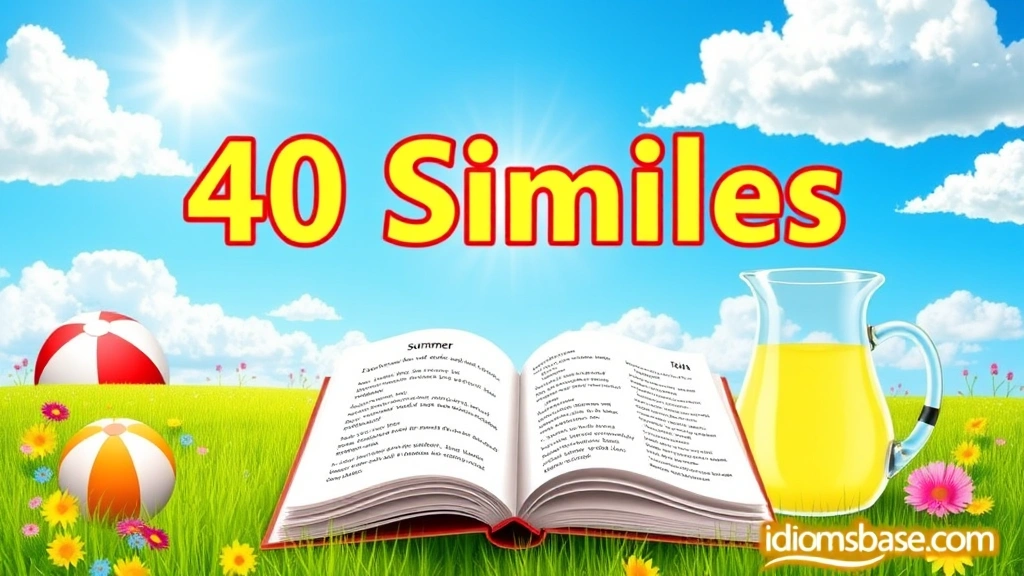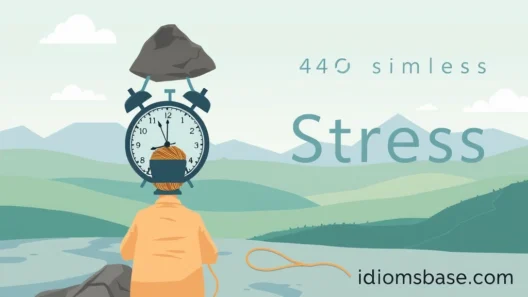Ah, summer! Just saying the word conjures up images, doesn't it? Long, sun-drenched days, the smell of barbecue in the air, and the delightful sound of children laughing. Summer is a season of vibrancy, warmth, and endless possibility. It’s a time when life feels a little lighter, a little brighter, and a whole lot more fun.
But how do you truly capture that feeling in words? How do you describe the golden glow of a sunset or the refreshing splash of a cool lake? That's where similes come in! Similes are like little magic wands for your writing, making comparisons that bring your descriptions to life. They help your readers see, feel, and even taste what you're describing.
Think of it this way: saying "the sun was hot" is okay, but saying "the sun was hot like a dragon's breath"? Now that's captivating! In this listicle, we're diving headfirst into the glorious world of summer similes. We've gathered 40 fantastic comparisons to inspire your writing, spark your imagination, and help you describe summer in ways you never thought possible. Ready to make your words shine like the summer sun? Let's go!
40 Similes for Summer: Painting Pictures with Words
Summer is a season of contrasts and delights. From scorching heat to refreshing breezes, from vibrant colors to tranquil moments, there are countless ways to describe its essence. Here are 40 similes to help you capture every nuance.
Similes Describing Summer Heat and Sun
The sun is the undisputed star of summer! How do you convey its powerful presence?
- Hot as a furnace: This one paints a clear picture of intense, inescapable heat.
- Bright as a thousand diamonds: Imagine the dazzling sparkle of sunlight on water or glass.
- Warm as a comforting hug: For those perfect, gentle summer afternoons.
- Blazing like a bonfire: When the sun feels truly fierce and untamed.
- Golden like melted butter: A lovely way to describe the rich, soft light of dawn or dusk.
- Fierce as a lion's roar: When the heat is overwhelming and demands respect.
- Scorching like a branding iron: For those days when the pavement burns your feet!
- Heavy as a wool blanket: When the humidity makes the air feel thick and oppressive.
- Radiant as a superstar: Capturing the sun's undeniable presence and glow.
- Intense as a spotlight: Highlighting how the sun can pinpoint and illuminate everything.
Similes Describing Summer Activities and Feelings
Summer isn't just about the weather; it's about what you do and how you feel!
- Free as a bird: The ultimate feeling of liberation that summer often brings.
- Relaxing as a soft hammock: Pure, unadulterated summer bliss.
- Sweet as fresh lemonade: That perfect, refreshing taste that defines the season.
- Joyful as a child on holiday: Capturing the pure, uninhibited happiness.
- Lively as a bustling market: When summer events and gatherings are in full swing.
- Cool as a mountain spring: The sensation of diving into refreshing water on a hot day.
- Refreshing as a cold drink: That instant relief when you quench your thirst.
- Endless as a dream: Reflecting the long, drawn-out days and seemingly infinite possibilities.
- Vibrant as a kaleidoscope: For the explosion of colors in nature and summer fashion.
- Calm as a still lake: Describing those peaceful, serene summer evenings.
Similes Describing Summer Nature and Scenery
From blooming flowers to buzzing bees, summer nature is a feast for the senses.
- Green as an emerald: For lush, vibrant summer foliage.
- Blue as a painter's palette: The sky and ocean on a perfect summer day.
- Buzzing like a beehive: The sound of insects, activity, and life in the air.
- Fragrant as a blooming garden: The delightful scents that fill the air.
- Lush as a jungle: When everything is overgrown and thriving.
- Bright as a sunflower: The cheerful, iconic flower of summer.
- Sparkling like scattered jewels: Dew drops on grass or sunlight on water.
- Whispering like secrets: The gentle sound of the wind through leaves.
- Rich as velvet: The deep, saturated colors of summer twilight.
- Soft as a summer breeze: The gentle touch of the wind on your skin.

Similes Describing Summer Sounds and Tastes
Summer engages all your senses, doesn't it?
- Chirping like a symphony: The delightful sounds of birds and crickets.
- Crisp as a fresh apple: The taste of perfectly ripe summer fruit.
- Sizzling like bacon on a grill: The sound and smell of summer cooking.
- Sweet as honey: The taste of ripe berries or a summer treat.
- Melodious as a distant song: The faint sounds of summer fun drifting on the breeze.
- Crackling like a campfire: The sound of a bonfire or fireworks.
- Juicy as a watermelon: That quintessential summer fruit experience.
- Bubbly as champagne: The effervescence of summer drinks and moods.
- Sharp as a sudden splash: The invigorating sound and feel of water.
- Humming like a lullaby: The soft, comforting sounds of a quiet summer night.
Why Use Similes? The Magic of Comparison
You might be wondering, "Why bother with similes when I can just say what I mean?" That's a great question, and the answer is simple: similes add depth, imagery, and emotion to your writing. They transform ordinary descriptions into vivid experiences.
Think about it:
- They create vivid imagery: Similes help your reader see what you're describing by comparing it to something familiar. "The air was heavy like a wool blanket" is much more evocative than "the air was humid."
- They evoke emotion: By linking something to an emotional experience, similes can make your reader feel what you're trying to convey. "Joyful as a child on holiday" instantly brings a smile to your face.
- They simplify complex ideas: Sometimes, a comparison can make something abstract easier to grasp.
- They make your writing memorable: Unique and well-chosen similes stick in the reader's mind, making your content more impactful.
- They show your creativity: Using similes demonstrates your mastery of language and your ability to think outside the box.

So, next time you're writing about summer, challenge yourself to use a simile! You'll be amazed at the difference it makes.
Frequently Asked Questions About Similes
You've got questions, we've got answers! Let's dive into some common queries about these delightful literary devices.
What is the difference between a simile and a metaphor?
Ah, the classic question! It's super simple, really.
- Similes make a comparison using "like" or "as." For example: "The sun was hot like a furnace." Or "The sky was blue as a painter's palette." They explicitly state the comparison.
- Metaphors make a comparison without using "like" or "as." They directly state that one thing is another. For example: "The sun was a furnace." Or "The sky was a painter's palette." They imply the comparison.
Think of it this way: a simile says "A is like B," while a metaphor says "A is B." Both are powerful, but similes are often a great starting point for adding descriptive flair.

How can I come up with my own similes?
Great question! It's easier than you think. Here’s a little trick:
- Pick an object or idea: Let's say you want to describe "the sound of summer."
- Think of its qualities: What is "the sound of summer" like? Is it gentle? Loud? Constant?
- Brainstorm other things with similar qualities:
- Gentle? Like a whisper, a lullaby, a soft rustle.
- Loud? Like a concert, a party, a stadium.
- Constant? Like a hum, a buzz, a heartbeat.
- Form your simile using "like" or "as": "The sound of summer was like a gentle lullaby." Or "The sound of summer was as constant as a heartbeat."
- Refine it: Does it make sense? Is it evocative? Does it fit the tone of your writing? Practice makes perfect!
Are similes only for creative writing?
Absolutely not! While similes are a staple in poetry, fiction, and creative non-fiction, they can enhance any type of writing. From marketing copy to blog posts, from presentations to everyday conversations, a well-placed simile can make your message clearer, more engaging, and more memorable. They're a fantastic tool for making abstract concepts more concrete and relatable.
Can I use more than one simile in a paragraph?
You certainly can! Just be mindful not to overdo it. Too many similes in one place can make your writing feel cluttered or forced. The key is balance. Use them strategically to highlight key moments or emotions, rather than sprinkling them everywhere. A good rule of thumb is to use them when you want to achieve a specific effect or create a strong image.
Are there any common mistakes to avoid when using similes?
Oh, yes! Here are a couple of pitfalls to steer clear of:
- Clichés: Avoid comparisons that are overused and have lost their impact, like "busy as a bee" (unless you're intentionally using it for humor or irony). Aim for fresh, original comparisons.
- Inappropriate comparisons: Make sure your simile actually makes sense and enhances your meaning. Comparing "the sun" to "a cold potato" wouldn't quite work, would it? The comparison should feel natural and fitting.
- Over-explaining: Let the simile do the work! You don't need to explain why something is like something else; the comparison should speak for itself.
Key Takeaways: Embrace the Summer Simile!
So, what have we learned from our sun-kissed journey through summer similes?
- Similes are powerful tools: They transform ordinary descriptions into extraordinary ones, making your writing vivid and memorable.
- They use "like" or "as": This is the defining characteristic that sets them apart from metaphors.
- Summer is a rich source: The season's myriad sensations – heat, light, sounds, tastes, and feelings – provide endless inspiration for comparisons.
- Practice makes perfect: The more you experiment with similes, the better you'll become at crafting them.
- They enhance all writing: Don't limit similes to just creative writing; they can elevate any piece of content.
Next time you're describing a summer day, a warm breeze, or a delicious ice cream, challenge yourself to reach for a simile. You'll not only make your writing more engaging but also discover new ways to appreciate the beauty and wonder of this incredible season. So go forth, and let your words shine bright, like the summer sun! What's your favorite summer simile? Share it with us in the comments below!






